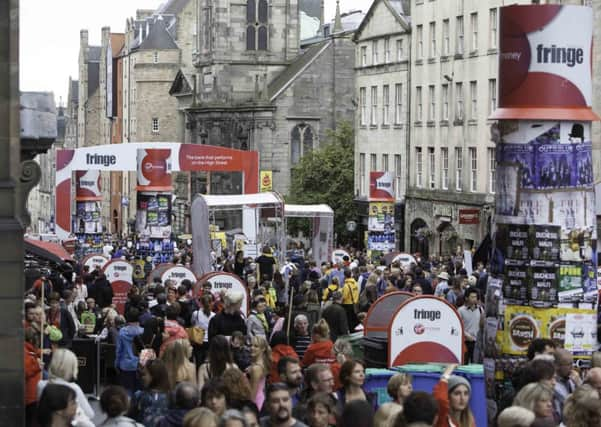Edinburgh Festival’s world class status ‘at risk’


Organises of the city’s money-spinning events said it was “essential” levels of financial backing were maintained in the face of wider budget cuts if Edinburgh was to retain its crown as the world’s leading festival city.
Faith Liddell, director of umbrella body Festivals Edinburgh, warned that other cities were waiting to knock Scotland’s capital “off its perch” because its model had been so successful.
Advertisement
Hide AdAlthough the festivals are attended by almost two thirds of people in Edinburgh, this rate drops to just 37 per cent in some areas, and plans are being drawn up to spread the benefits of the events, which are already worth £261 million to the Scottish economy and support 5242 jobs.
One idea, partly inspired by the success of the Commonwealth Games in Glasgow, is to encourage people to become “festival commuters” by staying in areas like the Borders, Glasgow and Fife and travelling in for events.
Ms Liddell warned that Holyrood’s tourism committee that the city’s reputation was at risk of being damaged by the cost of hotel rooms during the festivals season, saying they were now “at the limits of tolerable.”
The directors of the 12 leading festivals held during the year, including Edinburgh’s Hogmanay celebrations, sit on the board of Festivals Edinburgh, which helps raise extra funding from the likes of Edinburgh City Council, Creative Scotland and the Scottish Government.
Ms Liddell said the city’s global reputation was built on the “diverse, quality and international” nature of the festivals, but said there was a constant need to remain competitive with its global rivals, many of whom are in Edinburgh each summer to look at how the city’s leading events are run.
She said: “The programmes of our festivals sit at the heart of every other impact. They need to continue to be able to innovative, to be developed and be invested in. It doesn’t all need to be about growth. What’s most important is that we maintain the quality.
Advertisement
Hide Ad“In terms of challenges, we’d have to say that the contracting public purse and pressures on both council and broader governments are a threat to us.
“There are other trends that we need to be able to respond to and there is a continuing issue around competitor cities. We are generous with our model here, but we know there are cities around the world that want to knock Edinburgh off its perch.
Advertisement
Hide Ad“You have to think about the fact there are 20,000 artists in Edinburgh at the moment. For some places that would be a festival in itself in terms of the numbers.
“The festivals in Edinburgh are loved. Almost 60 per cent of people in the city attend our festivals. Obviously we want more to be able to come, but that’s a remarkable figure. When we tell that to our international colleagues they can’t believe it.”
The parliamentary hearing was held just days after the Edinburgh Festivals Forum, a commission formed seven years to ensure the city’s events remained at the highest level, announced it had commissioned a new 10-year plan.
Susan Rice, chair of the festivals forum, who is also managing director of the Lloyds Banking Group, said: “The festivals have been very fortunate indeed, even in the last seven years of financial difficulties, in sustaining funding from both national and city funding sources. That’s been absolutely essential.”
Fringe chief executive Kath Mainland said: “The thing to remember is that each of the 12 festivals in Edinburgh are uniquely distinct and independent and are formed because of the desire of artistic directors and programmers to show the best of what they want to the world.
“They have very good benefits in terms of their economic benefit, but they also offer the best platform in the world for Scottish artists and the best platform for international artists to come here.
Advertisement
Hide Ad“The challenge are about continuing to remember that’s why we are successful and making sure we have the best environment for artists, the industry, the media and audiences.”
SEE ALSO